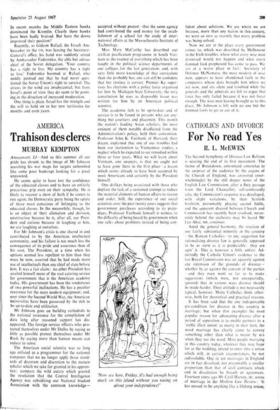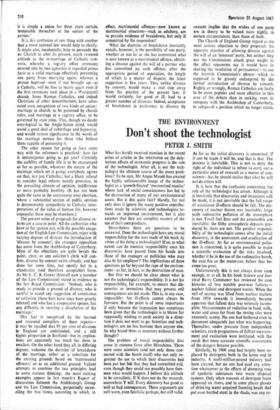For No read Yes
CATHOLICS AND DIVORCE
R. L. McEWEN The Second Symphony of Divorce Law Reform is nearing the end of its first movement. -The theme of Breakdown, announced somewhat to the surprise of the audience by the organs of the Church of England, was answered (over- whelmingly) by the still deeper notes of the English Law Commission; after a fluty passage from the Lord Chancellor, self-confessedly solo, the Commission's response was developed, with slight variations, by their Scottish brethren, presumably playing second fiddle, and the apparent discord between Church and Commission has recently been resolved; mean- while behind the orchestra may be heard Mr Leo Abse, MP, continuo.
Amid the general harmony, the reaction of one fairly substantial minority in the country --the Roman Catholics—to any suggestion for rationalising divorce law is generally supposed to be as stern as it is predictable: they are agin' it. This is however a little unfair. Ad- mittedly the Catholic Union's evidence to the last Royal Commission was set squarely against any extension of the grounds of divorce— whether by or against the consent of the parties —and they even went so far as to make , suggestions (which were, not unexpectedly, ignored) that in various ways divorce should be made harder. Their attitude is not necessarily typical, however. Many Catholics think other- wise, both for theoretical and practical reasons.
It has been said that the one indispensable pre-condition for divorce in this country is marriage; but when (for example) the most popular reason for advocating divorce after a period of separation is to enable partners to a 'stable illicit union' to marry in their turn, the word marriage has clearly come to convey something other than what is meant by RCS when they use the word. Most people marrying in this country today, whatever they may hope for at the wedding, intend to enter into a union which will, in certain circumstances, be not indissoluble. One in ten marriages in England are in fact dissolved, not presumably a smaller proportion than that of civil contracts which end in dissolution by breach or agreement. Fourteen years ago Mr Cyril Harvey, QC, wrote of marriage in the Modern Law Review: 'It has ceased to be anything like a lifelong union; it is simply a union for three years certain, terminable thereafter at the option of the parties.'
It is this confusion of one thing with another that a more rational law would help to clarify. It might also, incidentally, help to persuade the RC Church to alter its present, much resented attitude to the re-marriage of Catholic con- verts, whereby a registry office ceremony entered into by two agnostics is regarded prima facie as a valid marriage effectively preventing one party from marrying again; whereas a person baptised—even if not brought up—as a Catholic, will be free to marry again even if the first ceremony took place in a (Protestant) church. Some Roman Catholics, and indeed Christians of other denominations, have advo- cated state recognition of two kinds of union: marriage in church, to be governed by church rules, and marriage in a registry office, to be governed by state rules. This, though no doubt over-logical to the Anglo-Saxon mind, would avoid a great deal of subterfuge and hypocrisy, and would restore significance to the words of the marriage service for those who believe them capable of possessing it.
The other reason for going at least some way with the reformers is practical: how far is intransigence going to get you? Certainly the stability of family life is to be encouraged as far as possible, whatever the nature of the marriage which set it going; everybody agrees on that, not just Catholics; but a blank refusal to consider legal reform merely provokes, in the prevailing climate of opinion, indifference or more probably hostility. (It has not been quite the same in the controversy over abortion, where a substantial section of public opinion is demonstrably sympathetic to Catholic inter- pretations of the value of human life, however unpopular these may be elsewhere.) The present series of proposals for divorce re- form are a case in point. All the authorities who have so far spoken out, with the possible excep- tion of the English Law Commission, reject with varying degrees of distaste the introduction of 'divorce by consent'; the strongest opposition has come from the Archbishop of Canterbury. Most of the objections are quite beside the point, since, as any solicitor's clerk will con- firm, divorce by consent exists already, and has done for some time, not openly but in a clandestine (and therefore acceptable) form. As Mr L. C. B. Gower (himself now a member of the Law Commission) stated in evidence to the last Royal Commission : 'Nobody who is ready to provide a ground of divorce, who is careful to avoid any suggestion of connivance or collusion [these bars have since been greatly relaxed] and who has a cooperative spouse, has any difficulty in securing a dissolution of the marriage.'
This fact is recognised by the learned and reverend compilers of these reports— it may be recalled that 93 per cent of divorces in England are undefended, and a still higher proportion in Scotland—but its implica- tions are apparently too much for them to swallow. On the other hand they all, in differing degrees, welcome the doctrine of breakdown of the marriage, either as a substitute for the existing grounds based on 'matrimonial offences,' or as an additional ground. Valiant attempts to combine the two principles lead to some curious thinking: the most striking examples appear in last month's Report of discussions between the Archbishop's Group and the Law Commission, purportedly recon- ciling the two views, according to which, in effect, matrimonial offences—now known as matrimonial situations—such as adultery, are to provide evidence of breakdown, but only if committed by the respondent!
What the doctrine of breakdown inevitably entails, however, is the possibility of one party, whether or not he or she has committed what is now known as a matrimonial offence, obtain- ing a divorce against the will of a partner who has committed no such offence, after the appropriate period of separation, the length of which is a matter of dispute; the latest suggestion is five years. This, unlike divorce by consent, would make a real step away from the practice of the present law; it would certainly, for good or ill, lead to a greater number of divorces. Indeed, acceptance of breakdown in preference to divorce by
consent implies that the wishes of one party are in theory to be valued more highly, in certain circumstances, than those of both.
The Church of England Group regard as the most serious objection to their proposals the apparent injustice of allowing divorce against the will of an 'innocent' party, but neither they nor the Commissions attach great weight to the effect opponents say it would have in shaking the 'resolution of permanence'—to use the Scottish Commission's phrase—which is supposed to be gravely endangered by the formal introduction of divorce by consent. Rightly or wrongly, Roman Catholics are likely to be more popular and more effective in this area of the debate than in seeking, even in company with the Archbishop of Canterbury, to safeguard a position which no longer exists.































 Previous page
Previous page